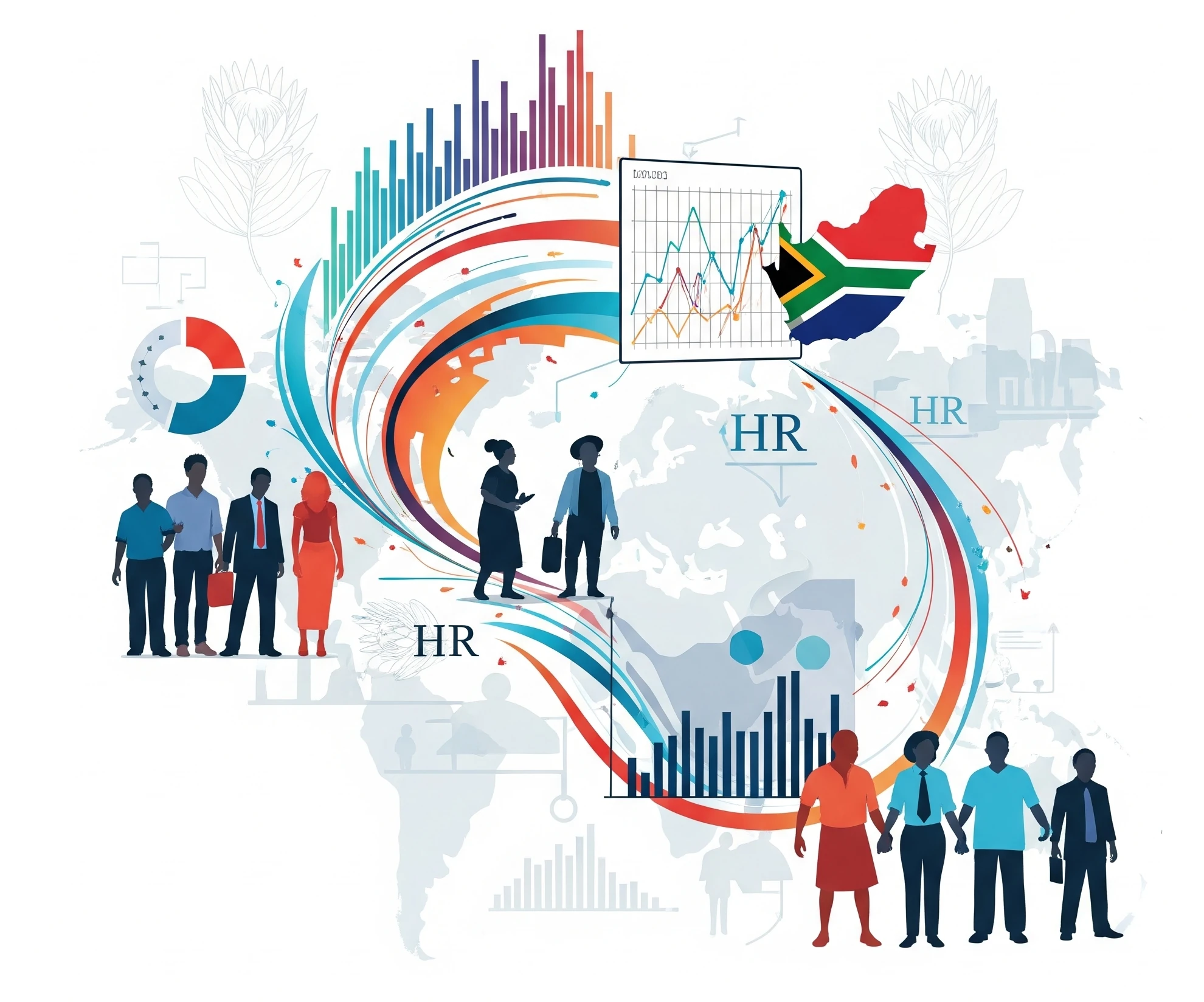In South Africa’s dynamic and often challenging talent landscape, the stakes for recruitment are higher than ever. It’s no longer enough to rely on gut feelings or traditional metrics like “time-to-hire.” To truly build a high-performing workforce, South African organisations need to embrace the power of People Analytics – transforming raw HR data into actionable insights for smarter, more strategic hiring decisions.
People analytics, also known as HR analytics or talent analytics, involves collecting, analysing, and interpreting data related to your workforce. When applied to recruitment, it helps answer critical questions like: Which sourcing channels deliver the best quality candidates? What attributes predict high performance and retention? Where are the bottlenecks in our hiring process? And crucially, how can we ensure our recruitment is fair and inclusive across South Africa’s diverse talent pool?
The Power of Data in South African Recruitment
For South African businesses, leveraging people analytics in hiring offers several transformative benefits:
- Improved Quality of Hire: By analysing the characteristics of your top performers and comparing them with new hires, you can refine your ideal candidate profile. This data-driven approach helps you identify what truly predicts success in your specific organisational context.
- Optimised Sourcing Channels: Are you spending too much on job boards that yield low-quality applications? People analytics allows you to track the effectiveness of different sourcing channels (e.g., job boards, referrals, social media, recruitment agencies) to pinpoint where your best talent truly comes from, optimising your recruitment budget.
- Streamlined Processes & Reduced Time-to-Hire: Data can highlight bottlenecks in your recruitment funnel. Is it the screening stage, interview scheduling, or offer approvals? Pinpointing these areas allows you to make targeted improvements, significantly reducing the time it takes to fill critical roles.
- Enhanced Candidate Experience: By analysing data on candidate drop-off points, survey feedback, and communication effectiveness, you can identify areas for improvement. A smoother, more transparent process translates into a better candidate experience, strengthening your employer brand in a competitive South African market.
- Boosting Diversity & Inclusion: People analytics can uncover unconscious biases in your hiring process. By analysing demographic data, success rates at different stages, and representation, you can identify where biases might exist and implement strategies to build a more diverse and inclusive workforce. This is particularly vital in South Africa’s commitment to transformation.
- Predictive Workforce Planning: Beyond current needs, analytics can help predict future talent requirements based on business growth, attrition rates, and emerging skill demands. This allows for proactive recruitment strategies, ensuring your organisation has the right talent when and where it needs it.
Implementing People Analytics for Smarter Hiring in SA
While the benefits are clear, implementing people analytics requires a strategic approach, especially within the South African context:
- Start with a Clear Business Question: Don’t just collect data for data’s sake. What specific recruitment challenge are you trying to solve? (e.g., “Why is our new hire turnover so high in sales?” or “Which interview questions best predict performance for engineers?”).
- Identify Your Data Sources: Your existing HR systems (ATS, HRIS), performance management tools, employee surveys, and even exit interviews are rich sources of data. Ensure data quality and consistency across these platforms.
- Focus on Key Metrics: For recruitment, consider metrics like:
- Source of Hire Quality: Which channels yield hires that stay longer and perform better?
- Time-to-Fill/Time-to-Hire: How long does it take to fill different roles?
- Cost-per-Hire: How much does it cost to fill various positions?
- Candidate Drop-off Rates: At what stages are candidates withdrawing from the process?
- Interview-to-Offer Ratio: How efficient are your interviewing panels?
- New Hire Retention/Performance: Are your hiring decisions leading to successful, long-term employees?
- Invest in the Right Tools & Skills: This could range from advanced spreadsheet capabilities to dedicated HR analytics software. You might also need to upskill existing HR professionals or bring in data analysis expertise.
- Ensure POPIA Compliance and Ethical Use: In South Africa, the Protection of Personal Information Act (POPIA) is critical. Ensure all data collection, storage, processing, and analysis adhere strictly to POPIA regulations, protecting employee privacy and preventing discriminatory outcomes. Transparency with employees about data use is paramount.
- Visualise and Communicate Insights: Data is only powerful if it’s understood. Use dashboards, graphs, and clear reports to present your findings to hiring managers and leadership, enabling them to make informed decisions.
Driving Strategic Talent Acquisition
People analytics moves recruitment from a reactive function to a strategic powerhouse. By systematically collecting and analysing data, South African organisations can gain profound insights into their talent acquisition processes, leading to more efficient, effective, and equitable hiring outcomes. This data-driven approach isn’t just a trend; it’s an imperative for building the resilient and high-performing workforces needed to thrive in South Africa’s evolving economic landscape.
